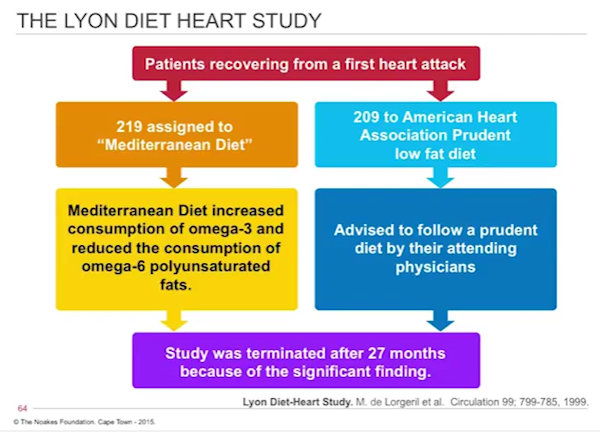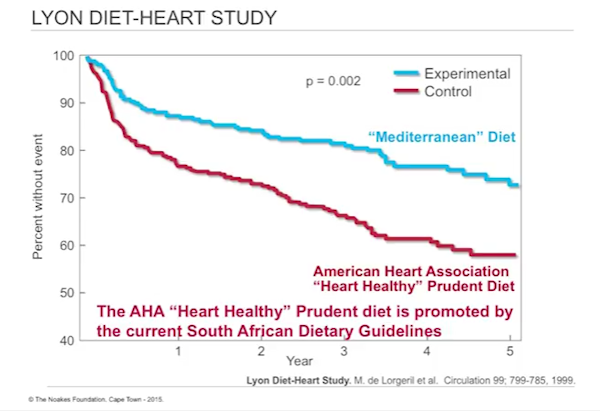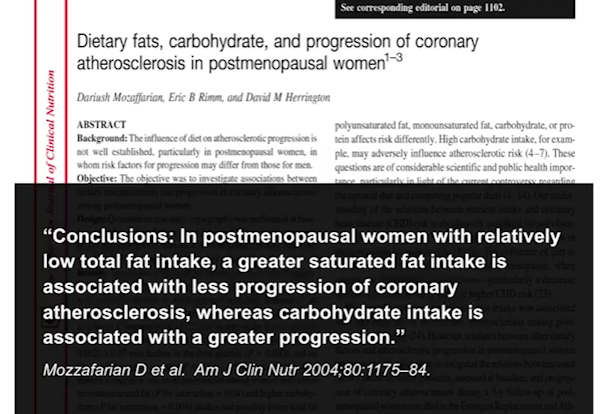From Video Fifteen
Professional Pride and Self Belief
In all professions, pride in what you are doing and commitment to a set of well founded principle and beliefs is important. But in science that ground shifts. For instance the Women's Health Initiative, proved that at least for older women, the low-fat high carbohydrate diet, doesn't improve health. They spent $700 million of the Women's Health Initiative, and it failed to produce the result everyone expected.
Today, members of the public are learning about the Banting diet and are educating their own doctors about it. In university, medical students are challenging their professors.
The university system is reluctant to change. This knowledge is not being taught. I wonder why they are so reluctant to change? A university can't maintain it's status as a first class institution, if it denies knowledge we know, in favour of ideas we know to be wrong. A university has a duty to past students, to existing students and to future students, to disseminate knowledge.
Professional pride, and belief in your own self worth are important values, but they must not bind us into a belief system that forbids new evidence and changes in understanding.
The Women's Health Initiative fails/succeeds?
The dietary study in the Women's Health Initiative, produced no health advantages for the 19,000 women who for eight years worked hard to maintain the recommended diet. From the profession there has been a silence. The silence of denial. They need to rethink their position - that's difficult to do. This is not a rogue result. For instance the Lyon Heart Study showed that the Mediterranean Diet was more effective than the recommended Standard American Diet.
 |
| Click to enlarge |
|---|
The Lyon Diet Heart Study, a randomized, controlled trial with free-living subjects, tested the effectiveness of a Mediterranean-type diet (consistent with the new AHA Dietary Guidelines) on composite measures of the coronary recurrence rate after a first heart attack.
Subjects in the experimental group were instructed by the research cardiologist and dietitian to adopt a Mediterranean-type diet that contained more bread, more root vegetables and green vegetables, more fish, fruit at least once daily, less red meat (replaced with poultry), and margarine supplied by the study to replace butter and cream.
Subjects in the control group were not closely supervised but their diet was typical of the diet eaten by most Americans.
 |
| Click to enlarge |
|---|
After 46 months of follow-up, 204 control and 219 experimental subjects (93% of the original cohort) participated in the final examination. The study was stopped early because of significant beneficial effects noted in the original cohort. Despite a similar coronary risk factor profile (plasma lipids and lipoproteins, systolic and diastolic blood pressure, body mass index, and smoking status), subjects following the Mediterranean-style diet had a 50% to 70% lower risk of recurrent heart disease.
The Women's Health Initiative result makes perfect sense if you believe as I do that insulin resistance is common, in at least 60% of the women in that study. The low-fat high carbohydrate diet will only work if people remain insulin sensitive.
Prof. Jacques Rossouw, MB.ChB., F.C.P. (S.A.), M.D., is the chief researcher of the Women's Health Initiative. He believes that insulin resistance is rare, in about 6% of the population. That's why he can't understand the result of the study he led.
We now have several studies that show that the recommended low-fat high-carbohydrate diet isn't beneficial for health, while the Mediterranean diet consistently produces a better result. In 2008, the Swedish experts Committee said the a low-carbohydrate high-fat diet was the best diet for weight loss, with no indication of long term adverse effects.
 |
| Click to enlarge |
|---|
As this study showed higher proportions of fat in the diet were protective in older women. If you have been eating a low fat diet, increasing the amount of fat in the diet and decreasing the amount of carbohydrate in the diet leads to less atherosclerosis (Hardening and narrowing of the arteries.) Quite the opposite of what we've been told.
Cardiologist are keen to develop new ways to treat heart disease, and to deal with patients who've had heart attacks. But I see the problem differently. I believe we can use lifestyle changes to prevent heart attacks. I expect that liver disease specialists will eventually show us that non-alcoholic fatty liver disease precedes both diabetes and heart disease. We can by dietary methods control and prevent non-alcoholic fatty liver disease.
 The Women's Health Initiative fails/succeeds?
The Women's Health Initiative fails/succeeds?